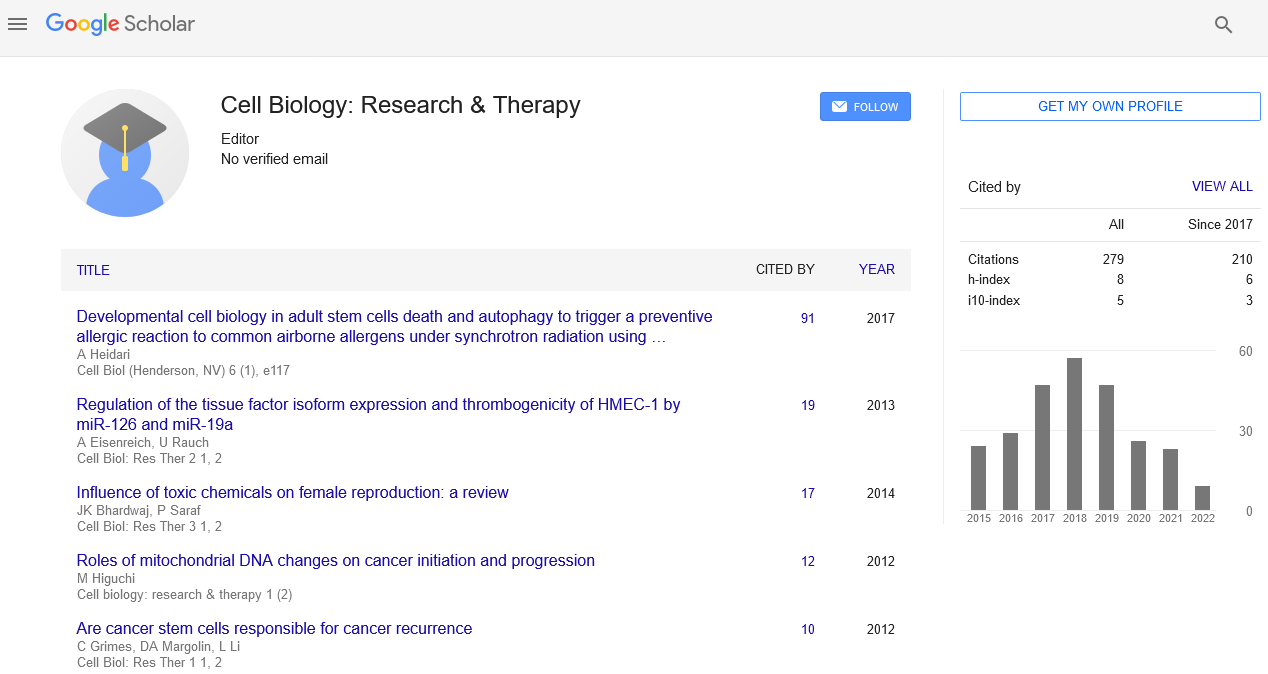Opinion Article, Cell Biol Vol: 12 Issue: 2
CD4 Cells Advancements in CD4 Cell Therapy
Mingjun Qin*
1Department of Immunology, Fudan University, Shanghai, China
*Corresponding Author: Mingjun Qin,
Department of Immunology, Fudan
University, Shanghai, China
E-mail: mingjun@qin.cn
Received date: 24 May, 2023, Manuscript No. CBRT-23-105050;
Editor assigned date: 26 May, 2023, PreQC No. CBRT-23-105050 (PQ);
Reviewed date: 09 June, 2023, QC No. CBRT-23-105050;
Revised date: 16 June, 2023, Manuscript No. CBRT-23-105050 (R);
Published date: 23 June, 2023 DOI: 10.4172/2324-9293.1000181
Citation: Qin M (2023) CD4 Cells Advancements in CD4 Cell Therapy. Cell Biol 12:2.
Description
CD4 cells, a vital component of the immune system, play a critical role in orchestrating immune responses and maintaining immune balance. Recent advancements in CD4 cell therapy have unveiled exciting possibilities in treating various diseases by harnessing the power of these versatile immune cells. This study will explore the principles, applications, and advancements in CD4 cell therapy, highlighting its potential in revolutionizing the field of immunotherapy.
CD4 cells, also known as helper T cells, are a type of white blood cell that coordinates immune responses. They play a crucial role in recognizing specific antigens presented by Antigen-Presenting Cells (APCs) and directing other immune cells to mount an appropriate response. CD4 cells are involved in activating B cells for antibody production, activating cytotoxic T cells to eliminate infected cells, and regulating the immune response to maintain immune homeostasis.
Principle
CD4 cell therapy involves the manipulation and activation of CD4 cells to enhance or modify immune responses. This can be achieved through various approaches, including adoptive cell transfer, genetic engineering, and immune modulation. The goal is to harness the therapeutic potential of CD4 cells to combat diseases, particularly cancer and autoimmune disorders.
CD4 cell therapy in cancer treatment
CD4 cell therapy has shown promising results in cancer treatment. By modifying CD4 cells to express Chimeric Antigen Receptors (CARs), similar to CAR-T cell therapy, researchers can enhance the ability of CD4 cells to recognize and eliminate cancer cells. Additionally, CD4 cells can be engineered to secrete specific cytokines or immune checkpoint inhibitors to modulate the tumor microenvironment and enhance anti-tumor immune responses.
Immune modulation and autoimmune disorders
CD4 cell therapy holds great potential in the treatment of autoimmune disorders, where the immune system mistakenly attacks healthy tissues. By manipulating CD4 cells, researchers can modulate immune responses to restore immune balance and suppress the autoimmune response. This can be achieved through the engineering of CD4 cells to express regulatory molecules or through the administration of modified CD4 cells to induce immune tolerance.
Combination therapies and immune potentiation
CD4 cell therapy can also be combined with other treatment modalities to potentiate immune responses. For example, combining CD4 cell therapy with checkpoint inhibitors or other immunomodulatory agents can enhance the efficacy of immune checkpoint blockade and improve responses in cancer patients. These combination therapies harness the synergy between CD4 cells and other components of the immune system to mount a robust and effective immune response against the disease.
Challenges
CD4 cell therapy faces challenges similar to other forms of immunotherapy, including optimizing efficacy, managing potential side effects, and overcoming resistance mechanisms. Researchers are actively working to refine CD4 cell therapy approaches, improve cell expansion and persistence, and enhance targeting capabilities to maximize therapeutic benefits. Ongoing research and clinical trials will shed light on the optimal strategies for harnessing the power of CD4 cells in different disease contexts.
Conclusion
CD4 cell therapy represents a promising frontier in immunotherapy, capitalizing on the multifaceted functions of CD4 cells to combat cancer and autoimmune disorders. The ability to manipulate and activate CD4 cells opens up new avenues for personalized and targeted treatments. As research and clinical trials continue to expand our understanding of CD4 cell therapy, we can anticipate significant advancements in optimizing its efficacy, safety, and applicability in diverse disease settings. Harnessing the power of CD4 cells holds great potential in revolutionizing the field of immunotherapy and improving patient outcomes. Continued research and innovation in CD4 cell therapy will pave the way for transformative treatments and contribute to the advancement of precision medicine.
 Spanish
Spanish  Chinese
Chinese  Russian
Russian  German
German  French
French  Japanese
Japanese  Portuguese
Portuguese  Hindi
Hindi 